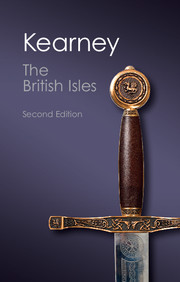Book contents
- Frontmatter
- Contents
- List of illustrations
- List of maps
- Preface to the first edition
- Preface to the second edition
- Map: the British Isles
- Introduction
- 1 The Celtic societies of the British Isles
- 2 The impact of Rome on the British Isles
- 3 The post-Roman centuries
- 4 The Vikings and the fall of the Old Order
- 5 The Norman and post-Norman ascendancy
- 6 The decline of the post-Norman empire
- 7 The making of an English empire
- 8 The remaking of an empire
- 9 The Britannic melting pot
- 10 The rise of ethnic politics
- 11 Between the wars
- 12 Withdrawal from empire
- 13 Post-imperial Britain: post-nationalist Ireland
- Afterword
- Selected reading list
- Index
Preface to the second edition
Published online by Cambridge University Press: 05 June 2014
- Frontmatter
- Contents
- List of illustrations
- List of maps
- Preface to the first edition
- Preface to the second edition
- Map: the British Isles
- Introduction
- 1 The Celtic societies of the British Isles
- 2 The impact of Rome on the British Isles
- 3 The post-Roman centuries
- 4 The Vikings and the fall of the Old Order
- 5 The Norman and post-Norman ascendancy
- 6 The decline of the post-Norman empire
- 7 The making of an English empire
- 8 The remaking of an empire
- 9 The Britannic melting pot
- 10 The rise of ethnic politics
- 11 Between the wars
- 12 Withdrawal from empire
- 13 Post-imperial Britain: post-nationalist Ireland
- Afterword
- Selected reading list
- Index
Summary
On St George's Day 1993 John Major, Prime Minister of the United Kingdom, addressed a group of the Conservative party as follows:
Fifty years from now Britain will still be the country of long shadows on county [cricket] grounds, warm beer, invincible green suburbs, dog lovers and pools fillers and – as George Orwell said – ‘old maids bicycling to Holy Communion through the morning mist’ – and – if we get our way Shakespeare still read in school. Britain will survive unamendable in all essentials. (quoted Richard Weight, Patriots: National Identity in Britain 1940–2000, London, 2002, p. 666)
This passage illustrates vividly the type of Anglo-centricity which I criticise in The British Isles. John Major refers to Britain, an island which encompasses Wales and Scotland, but the ‘Britain’ which he evokes is very much an idealised version of southern England. There is no hint here of the industrialised cities of northern England, South Wales and south-west Scotland with their commitment to football grounds set in grimly urban surroundings. Nor is there any hint of the way in which new ethnic groups are changing the ‘essentials’ of Britain, especially in the capital, London. Missing also from Major's nostalgic musing is any sense that the most determinedly British element of the United Kingdom is to be found in Northern Ireland, where in some Unionist areas pavements are painted red, white and blue.
The Southern England of John Major's vision undoubtedly exists. It is, however, merely part of a wider United Kingdom of Great Britain and Northern Ireland, whose history until recently also included that of ‘the British Isles’ as a whole.
Information
- Type
- Chapter
- Information
- The British IslesA History of Four Nations, pp. xv - xviiPublisher: Cambridge University PressPrint publication year: 2012
